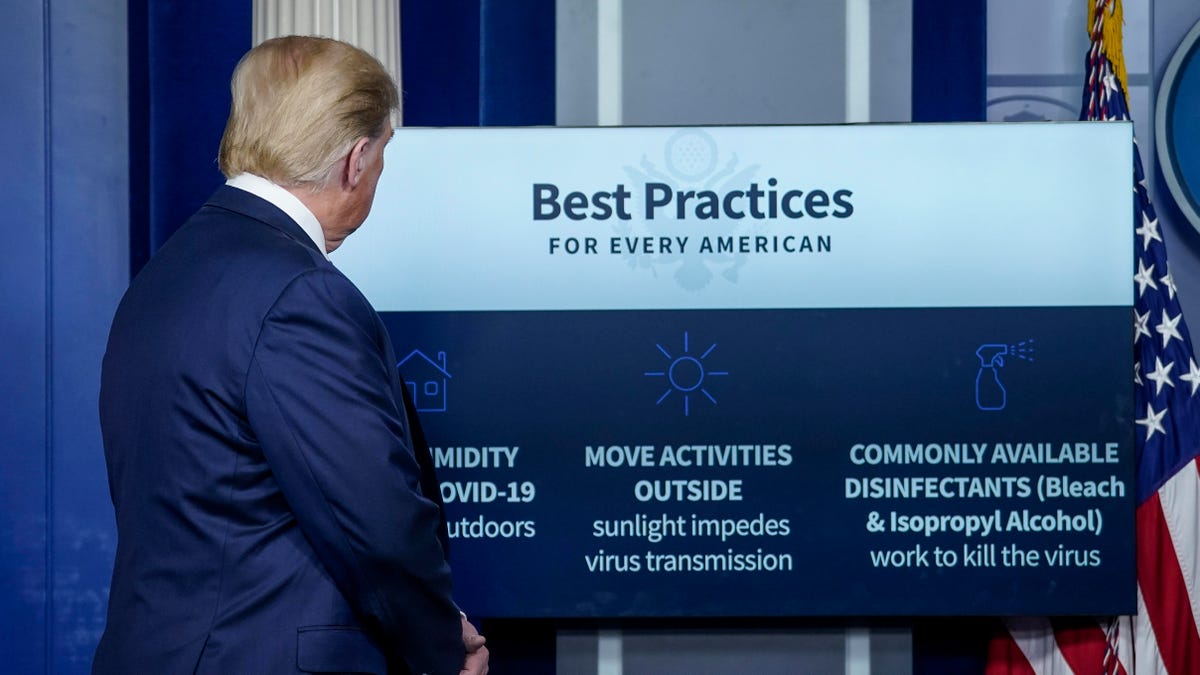Trump recklessly suggests injecting disinfectant to kill coronavirus. Why he's wrong
Disinfectants, like bleach and isopropyl alcohol, are toxic and should not be consumed, ingested or injected to fight COVID-19.

President Donald Trump examines slides on disinfectants during a press briefing on April 23.
During a White House press briefing on Thursday, President Donald Trump floated the idea of injecting disinfectant or using ultraviolet or "very powerful" light inside the body as a coronavirus remedy. Disinfectants are toxic chemicals that are poisonous to the human body and should not be injected. Similarly, ultraviolet light contains energy powerful enough to damage DNA.
"I see the disinfectant that knocks it out in a minute," said Trump, turning to Deborah Birx, the coronavirus response coordinator in the White House task force and Bill Bryan, head of the science and technology directorate at the Department of Homeland Security. "Is there a way we can do something like that by injection inside or almost a cleaning?" he asked.
Both claims were immediately criticized by doctors and physicians.
Hi, ER Doc here.
— Sam Ghali, M.D. (@EM_RESUS) April 23, 2020
Do NOT inject or consume ANY disinfectants in an attempt to kill COVID19.
The president's claims came after a short presentation by Bryan which showed a slide discussing how commonly used disinfectants such as bleach and isopropyl alcohol can work to kill the virus. These disinfectants are only useful in killing the coronavirus on surfaces, outside the human body, like kitchen counter tops and tables. They are toxic. They should never be ingested or injected.
"They're not meant for internal consumption," says Ian Musgrave, a pharmacologist and senior lecturer at the University of Adelaide. "Things like disinfectant and bleach are very good at killing viruses and bacteria but they're also very good at killing our own cells."
Musgrave points out the purpose of a drug is to "specifically" target viruses and bacteria without doing damage to the human body. Disinfectants and UV lights are not drugs. "These things can't tell the difference between viruses and your own cells," he says.
You cannot disinfect your body from the inside.
Many disinfectants, like household bleach, can create extensive organ damage in the gastrointestinal tract and throat if they are ingested in high amounts. Musgrave notes this is "incredibly painful and not pleasant." Exposure to vapors can cause lung injury. Injection of disinfectants can be particularly damaging -- as shown in a case study published in the journal Toxicology Observation in 2013 -- where a patient's blood cells were ripped apart by household bleach and a renal transplant was required.
Following speculation about disinfectants as a treatment for coronavirus, Lysol and Dettol maker RB on Friday issued a statement that saying "under no circumstance should our disinfectant products be administered into the human body (through injection, ingestion or any other route)."
The White House briefing Thursday also included the notion "sunlight impedes virus transmission" and Trump appeared to tout ultraviolet or "very powerful light" as a potential treatment option if it was brought "inside the body". The World Health Organization's current advice on UV light lamps is they "should not be used to sterilize hands or other areas of the skin." Ultraviolet light -- like that emitted by the sun and other sources -- is known to be damaging to the skin and is the cause for practically all skin cancers.
Both UV and disinfectants should only be used for cleaning surfaces.
"If you want to disinfect surfaces, ultraviolet is very good at disinfecting surfaces," says Musgrave, "and it's great to rub down the your benches and tabletops with 70% alcohol" before reiterating they are not meant to be ingested.
Even when using disinfectants for cleaning, people need to be careful. In a web post Friday, the US Centers for Disease Control underlined how nasty these chemicals can be. The CDC said that at the start of last month, daily calls to poison centers had "increased sharply" in regard to exposures to disinfectants and cleaners. "Clean safely," the CDC said. "Follow label directions, don't mix chemicals, wear protective gear, use in a well-ventilated area and store chemicals out of reach of kids."
The best ways to protect yourself from COVID-19 remain:
- Washing your hands frequently
- Social distancing
- Avoiding touching your mouth, eyes, nose
- Practice good respiratory hygiene
There are no FDA approved treatments or vaccines for dealing with a COVID-19 infection. Instead, doctors manage symptoms of the disease as best they can. There are dozens of potential treatment options being explored across the globe, but none have passed safety and efficacy trials in humans.

